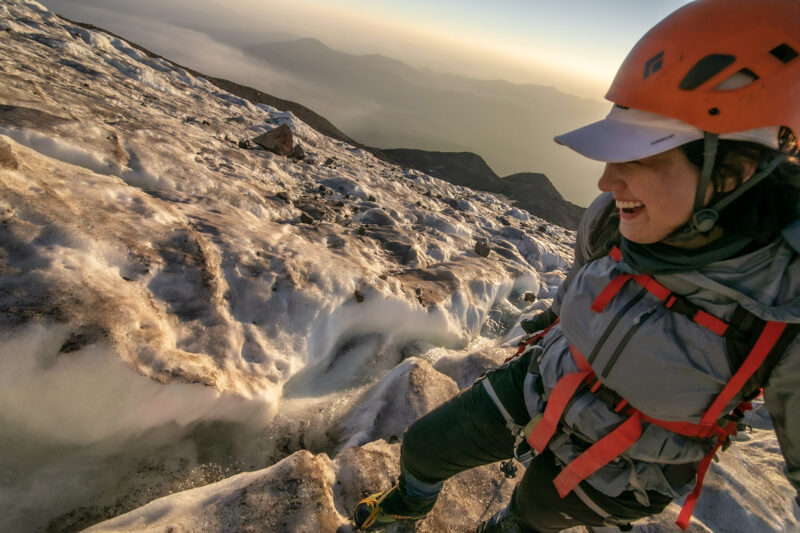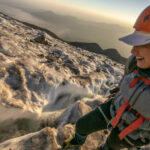As a queer, mixed Asian American woman and a “not-quite-plus-size” person, I feel that people sometimes underestimate my abilities on the trail. I am often stopped by well-meaning hikers assuming I need directions or encouragement, commenting on my pace, or asking “are you OK?“. Like — if I am breathing hard, it must be because of my size, not because this mountain is f-ing hard! I know my own limits and they are far beyond what everyone expects of me, and honestly often even what I expect of myself. I’ve been working on hiking my own hike and not internalizing these comments as fodder for comparison. A lot of my training has been mental in addition to physical.
Mountaineering is one of those elite sports like polo or sailing, requiring a lot of equipment, money, know-how, and connections. As someone who happened to receive a Summit Scholarship this year, I feel grateful, but I also know it was pure luck [Editor’s note: luck AND skill, Marisa]. I recognize the emotional labor required of every applicant who submitted an essay. Not to mention the fact that AWE offers one of the few opportunities that supports women in high-altitude mountaineering. (I hope other organizations and companies take their lead!)
The systemic barriers that mountaineers with marginalized identities face make me feel angry because I have struggled for years to get here, to the start line. If — as I was — you’re homeless, working a minimum-wage job, managing your mental illnesses while lacking social and community support, you’re not going to say, “Tomorrow on my one day off I’m going to go train on this mountain.” That just doesn’t make sense. You’re probably going to be focusing all your energy on fulfilling your basic human needs like shelter and food. You’re not going to be going out and camping in a tent, because your regular life already feels like survival. At least, this was my experience
When I am in the mountains, I have no doubt that that is where I need to be in that very moment. It grounds me and affirms why I am here on Earth.
Mountaineering is exhausting, a type 2 kind of fun. I think of it as voluntary suffering. It is also one of the most rewarding things in my life. When I am in the mountains, I have no doubt that that is where I need to be in that very moment. It grounds me and affirms why I am here on Earth. Mountaineering makes me feel alive and everyone deserves something that makes them feel that way. Even (especially) when a hiking trip turns out to be ridiculous and terrifying and demolishes me by the end, I feel lucky each day I get to train and be outside in nature. One of the reasons I want to become a professional athlete is to serve as a leader in alpine environments and help to level the playing field. Lately, I’ve been watching a lot of mountain trail-running videos for inspiration. I’m fascinated by the physical and mental strength and endurance of these female ultrarunners. I want to be my best self so others can be their best selves too.
Right now I’m working on the SoCal Six-Pack of Peaks, which is really exciting because it’s been a goal of mine for years. Besides Shasta — home to the Wintu tribe, among others — I’m also looking forward to an attempt of Mt. Baker (Komo Kulshan) this summer, supported by a scholarship from Melissa Arnot and Pacific Alpine Guides. I try to stay present and focused on the goals I have in front of me. Eventually I’d love to travel to the Himalayas. I’ve been reading books and watching movies about Everest and K2 since I was a little kid. It’s really important to me to respect the mountains by practicing Leave No Trace, supporting local communities, and being physically prepared for the challenges they bring. One of my dreams is to become a pro mountain athlete. It’s wild to me to even have the chance to pursue the things I love.


Marisa Cherry
Marisa hails from Rancho Cucamonga in California. She has a deep seated love and, dare we say, need for adventure. It’s something that we at AWE can relate to — trails and mountains have a healing and balancing power that we all know is hard to convey to the uninitiated. No, mountaineering is not solving world hunger, nor is it an elemental human need – but it can make a big difference in the life of anyone who has the freedom of being able to head into the mountains. This is the second year in a row that Marisa applied for the Summit Scholarship, and in 2021 she received an award to climb Mt. Shasta – funded by The Cairn Project.
